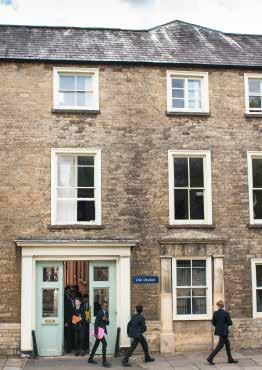THE SIXTH FORM
2025 – 2027
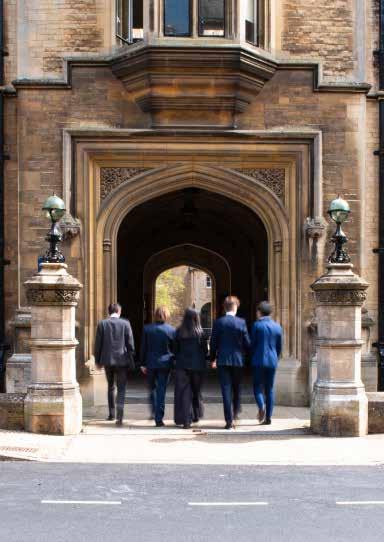
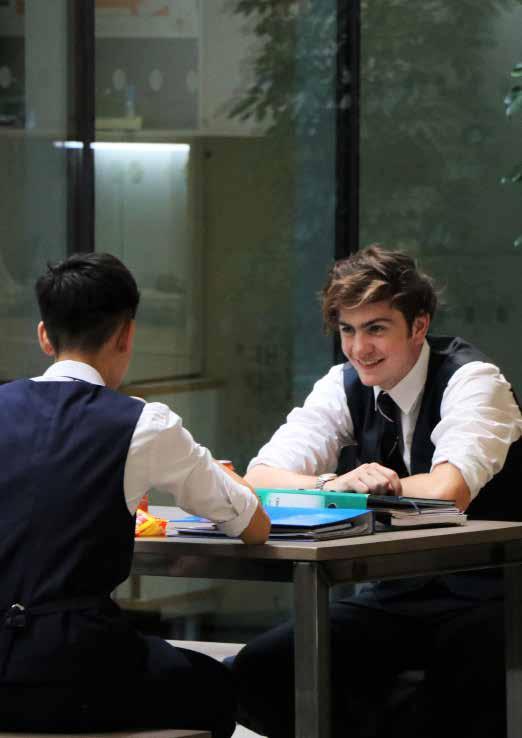


THE SIXTH FORM
2025 – 2027



Oundle School offers its pupils a broad and flexible programme of study for the Sixth Form. For the first time in your School career, you have the freedom to make your subject choices and thereby to mould your future from your individualised programme of study.
This is an exciting and privileged opportunity, which has the potential to translate to the most rewarding time of your years at the School. With this, therefore comes the responsibility of choosing your options carefully and wisely, taking timely and targeted advice from those people who know you best and who are the most informed. Your Sixth Form choices will influence and affect your future career options, and are consequently of great importance.You cannot guarantee success, but you can do your best to ensure it by selecting subjects that you will enjoy and in which, where possible, you already have a good indication of ability.
I am delighted to be able to offer you a wide variety of principal subjects, which can be chosen in any combination, alongside a range of extension options that offer different experiences and challenges to engage all pupils. The following pages outline each of the courses and give you initial insight into how your learning will develop over the next two years.
Membership of the Sixth Form differs from your experiences in School to date. You will have lessons in a smaller number of subjects, in which the volume of work will be greater and the pace will be faster. The expectation for wider private reading and understanding will be much larger, and a commitment to regular independent study is, therefore, essential. With these freedoms comes responsibility, particularly in terms of managing your own workload, and having the maturity and self-direction to motivate yourself. In return, you will have access to much more individual assistance and guidance from your teachers, all subject specialists, in a dynamic and supportive learning environment.
Adam Baragwanath Deputy Head Academic
The Oundle Sixth Form curriculum is designed to stimulate the mind and equip pupils to think. Courses are structured around learning rather than assessment, but in a way that enables pupils to achieve the best possible examination results. The curriculum is sufficiently flexible to give all pupils the opportunity to excel. The examined and non-examined strands of the curriculum are complementary and mutually reinforcing. Through the curriculum we wish to ensure the best possible progression to Higher Education.
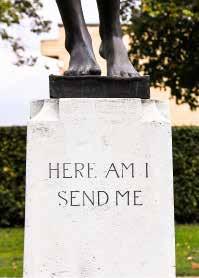
The minimum requirement for progression to the Sixth Form is three grade 7s and three grade 6s at GCSE, with grade 6 in both English Language and Mathematics. It is also desirable to have achieved a grade 7, 8 or 9 in those subjects to be studied in the Sixth Form: pupils are advised to work to their strengths
Pupils are required to make five choices within the curriculum structure shown in the table on page 7 of this booklet.
A minimum of three choices must be two-year courses.
It will usually be expected that pupils will start with four principal subjects and an extension option.
Pupils who wish to begin with only three principal subjects and two one-year courses will need to seek the permission of the Deputy Head Academic.
The purpose of the fifth option is to offer the pupils possibility of enrichment and challenge tailored to each pupil’s needs or interests. These options run during the Lower Sixth only.
All pupils take this course in the Upper Sixth. It is based on lectures given by eminent guests on a wide range of topics, a Sixth Form concert and a ‘Concept of Remembrance’ lecture are held annually.
The great majority of pupils start with four principal subjects and an extension option. Indeed, pupils are strongly advised to start with a broader range of subjects, which can then be narrowed later in the Sixth Form.
Some pupils may wish to begin the Lower Sixth Form with only three principal subjects and two one-year courses. Recommendation for this must come from a pupil’s Tutor and/or Hsm, and permission must be sought from the Deputy Head Academic.
Pupils are strongly discouraged from approaching any subject considering it to be their “fourth” option, as a negative mindset is often self-reinforcing, and experience shows that a rank order of preference often changes throughout the year.
All the principal subjects are available to choose from in any combination. There have been very few occasions in the past when it has not been possible to accommodate a pupil’s requested combination, or when too few pupils have requested a course to make it viable — the School reserves the right in these cases to withdraw a subject from the offered curriculum. Since one pupil’s options may influence the availability of courses to other pupils, we ask all pupils to research their options carefully and give full consideration to their choices before the deadline. Advice is available from teachers, tutors/Hsms and the Careers Department. It is not possible to guarantee a pupil first choice of subject after the January deadline.
Principal subjects:
• Art • Biology
• Computing
• Economics
• Chemistry
• Classical Civilisation
• Classical Greek
• Design Engineering & Technology • Drama and Theatre
• English Literature
• Government & Politics
• Mandarin Chinese
• Russian
• Spanish
• French • Geography
• History • History of Art
• Mathematics
• Music
• Sport Science
• Theology, Philosophy & Religion
• Mathematics and Further Mathematics
• German
• Italian • Latin
• Physics
• Psychology
• Quadrivium
• Extended Project Qualification
• Extended Project Qualification
• ab initio Italian, Portuguese or Classical Greek
• Music Diploma
In addition to the mainstream examined subjects, the School offers a choice of extension options, of which pupils are required to choose at least one.
Their purpose is to offer the possibility of enrichment and challenge tailored to each pupil’s needs.
Extension Courses run during the Lower Sixth only. Pupils may opt for Oundle’s internal, bespoke
Quadrivium course (a development from the Trivium as studied by all Third Form), or to research and write an individual project, leading to the award of the AQA Level 3 Extended Project Qualification, equivalent to an AS level.
Small numbers of pupils may wish to consider the following options instead.
• Able and interested modern linguists may wish to consider adding another language to their portfolio. Ab initio Italian and Portuguese are both available for study, leading to an examination (IGCSE or equivalent) after one year.
• Ab initio Classical Greek is available to pupils who do not already have a GCSE in Greek and are interested in applying to university to read Classics.
All three ab initio courses are demanding by their nature: pupils will need to commit to undertaking significant amounts of independent work in order to reach the required standard within two terms.
• Gifted Musicians, studying for their Diploma, may opt for Music Diploma, where they will be given extra tuition and support from Mr Gibbon, as well as essential time to practise with their instruments.

For some pupils, Study Assistance will be an essential part of their Sixth Form academic experience. Membership of this course is by recommendation and invitation only; pupils cannot choose this course themselves
This course is aimed at pupils who may need extra support and encouragement in the transition from GCSE to A level. It aims to provide a sound foundation for Sixth Form studies by encouraging pupils to improve study methods, organisation, approach, attitude and effectiveness. Some subject specialists will be on hand to go through things pupils have found difficult and to improve their understanding. Pupils will still be expected to make the most of academic voluntaries in addition to this. Opting for Study Assistance should be in consultation with tutors and Hsms, but places are limited and are at the discretion of the Deputy Head Academic. Some pupils will be directed towards this course.
Trudie Raftery Study Assistance co-ordinator
Mid October
Lent Term
May/June August
Fifth Form practice examinations (I)GCSE predicted grades confirmed
Introduction to Sixth Form choices talk and LfL
Fifth Form Parents’ Reception
Sixth Form choices submitted
(I)GCSE examinations
(I)GCSE results published
Michaelmas Term begins
Subject Assessments
Pupils may choose to discontinue study of one A level Subject
Further opportunities for subject drops
Draft predicted grades published
Internal end-of-year examinations
Predicted grades confirmed (to be used in university applications)
Internal deadline for applications to Cambridge, Oxford, Medicine, Dentistry and Veterinary Science
Internal deadline for other UCAS applications
A level practice examinations (internal)
A level examinations
A level results
Choosing Sixth Form subjects is a tricky business, particularly for those pupils whose interests are broad. In order to frame discussions on which subjects to pick, pupils should start by asking themselves four simple questions:
1 WHICH SUBJECTS INTEREST ME THE MOST?
2 WHICH SUBJECTS AM I GOOD AT?
The first two considerations are arguably the most important. If a pupil is interested in a subject, it is more likely that he or she will excel. Similarly, if a pupil has performed well in a particular subject at GCSE, success at A level is far more likely. However, these two factors do not always guarantee future success. While the rigour of our GCSE courses makes the transition from GCSE to A level study relatively smooth, in many subjects there is an acute jump in the conceptual demands placed on pupils in the Sixth Form. There are cases every year where pupils find a chosen A level course particularly challenging, and, by extension, unenjoyable, despite having enjoyed that subject, and experienced considerable success in it at GCSE. This being said, a desire to learn more about a particular subject, combined with an innate talent for that subject, is a potent blend that, more often than not, leads to successful outcomes in the Sixth Form. Added to this, where A level subjects support each other in terms of the skills developed. This can help pupils to flourish in each of them.
3 DO MY PROPOSED SUBJECT CHOICES WORK TOGETHER?
4WHICH SUBJECTS ARE REQUIRED TO ACCESS MY DESIRED OPTIONS BEYOND OUNDLE?
The final question, although important, is the one on which the least emphasis should be placed. While for some degree courses there are certain prerequisite A level courses, successful applications to leading universities are rarely determined by subject choice alone. Successful university applications ultimately depend on a pupil’s level of achievement in a certain discipline and their engagement with it. There is no substitute for this. The following website, created by the Russel Group, provides a good introduction to A level subject selection and university courses: https://www.informedchoices.ac.uk/
SUPPORT
Help and support is always on hand, and talking to a wide range of people about your particular abilities and interests is essential. Pupils should consult their subject teachers, Heads of Department, tutors, Housemaster or Housemistress, the Careers Department and, if necessary, the Deputy Head Academic when considering options. Parents should also be consulted at every stage of the process. The advice from subject teachers is key in this equation; they are the ones who will be able to give honest and practical advice as to how individuals may find the jump in challenge in their subject, and their likelihood of long term success.
We expect pupils to research their choices fully before they make them and to make a full commitment to their studies. In the first few weeks of the Lower Sixth we do allow some pupils to change subject in exceptional circumstances.
Pupils are strongly encouraged to continue with the study of four A level subjects for at least the first two terms of their Lower Sixth year; doing so will ensure pupils keep their options open and maintain a breadth in their education. These reports and grades will help inform discussions about which subject a pupil may wish to discontinue. Subject drops will be permitted at this end of Michaelmas Term in cases where
• Tutors are satisfied with the drop and feel it is in the pupil’s best interests.
• A pupil’s remaining three subjects do not close doors prematurely for their options beyond Oundle.
• A clear plan is in place as to how the pupil will make use of their newly found Private Reading sessions.
• Parents have been consulted and are happy with the decision to drop a subject.
Further opportunities for subject drops will be available during the Lent Term of Lower Sixth, and at the end of the Lower Sixth year.
Subject combinations should be made based on aptitude and enjoyment but also with potential ambitions for the future in mind. It is important that choices are not made that will weaken or prevent a university application later on. It is the responsibility of the pupil to research choices carefully. The Careers Department —situated in Cloisters—provides advice to pupils in Fifth Form via the Learning for Life programme and can offer individual advice about Sixth Form choices by appointment. All pupils will also attend an Options Carousel morning after the Practice Exams and have access to the Unifrog website - a comprehensive careers information platform, which allows them to explore degree course content and entry requirements.
For further information or advice please visit the department or e-mail Mrs Aubury: ema@oundleschool.org.uk.
In the Sixth Form, a much stronger emphasis is placed on academic learning beyond the classroom and the prescribed specifications. Sixth Formers are expected to work more independently and to take full advantage of the resources that the Library and academic departments provide. All departments offer an exciting programme of society meetings, lectures, trips and academic surgeries, and Sixth Formers are encouraged to participate actively in all the opportunities on offer.
Equally, the co-curricular life of the School continues to offer a vast array of opportunities, from theatre productions and art exhibitions to concerts and sports fixtures, along with numerous leadership roles for Sixth Formers. As for all Oundelians, the expectation is that Sixth Formers continue to play a full and committed part in the co-curricular life of the School. Juggling this with the various academic demands will, at times, present challenges, but it is through overcoming these challenges and balancing these conflicting demands that ultimately makes life in the Sixth Form so rewarding.
Some subjects are offered in the Sixth Form that pupils will not have met previously: Classical Civilisation, Economics, Government and Politics, History of Art and Psychology. It is our strong advice that pupils avoid choosing combinations of three or more of these subjects and to think carefully about choosing two, as at least one will have to be taken through to the end of the Upper Sixth Form.
The A level system requires, by its nature, that pupils specialise in the Sixth Form – it is not generally advisable for pupils to try to maintain a lot of breadth within the four subjects they choose. In general, pupils are more successful where their A-level subjects support each other in terms of the skills that are being developed (e.g. Maths, Physics, Computer Science, DET; or French, Spanish, English, RS; etc).
Particular degree course subjects may require specific subjects to be taken at A level so future choices will be affected by the decisions made at this stage. This information is readily available through the Careers Department, university websites and the UCAS website, and it is vital that assumptions are not made. The list on the following page is not exhaustive, but reflects the subjects about which misconceptions are most often held. If a pupil has an ambition to study that subject at university, then the required A level subjects should be chosen. However, if the pupil does not like, or is not good at that subject(s), it is advisable to reconsider the eventual degree course choice. An applicant is more competitive (and employable) if they study subjects they can excel in and follow that path at the highest level, rather than doing less well in another subject in order to pursue a predetermined route through Higher Education.
University applications are made in the Michaelmas Term of the Upper Sixth, either for entry immediately upon leaving School or for deferred entry after a gap year. There is a Careers Department Assembly for Lower Sixth Form pupils in each half term and these are followed up with sessions in Houses. These provide detailed guidance and information about university applications, both in the UK and overseas, as well as about Degree Apprenticeships. There is a Zoom Q&A session for parents in each term too. In addition, the Careers Department staff are available throughout the school year and pupils are encouraged to seek detailed advice before making applications. There are specialist advisors for medics/vets/dentists, Oxbridge applicants and overseas applicants.
UK universities make offers on the basis of A level predictions. Draft grades are issued in the Lent Term of the Lower Sixth, based on pupils’ performance throughout the year. These are then reviewed and confirmed at the end of June, following internal examinations.
Applications are enhanced by supercurricular engagement and, where relevant, work experience, and pupils should take every opportunity to demonstrate their interest and commitment by seeking out relevant experience.
• All pupils, and especially those aiming for top universities, should read around their subjects.
• Academic Society lectures are very useful.
• Pupils thinking of Science at Cambridge or Oxford may wish to take the Quadrivium, Biology, Chemistry or Engineering options, or choose a targeted project as part of the EPQ.
• Pupils looking to take a degree subject which they have not studied at School can use either a relevant Quadrivium course or the EPQ as a valuable opportunity to research that area in more depth.
• Achieving A*/A/B for an EPQ can lead to reduced university offers for some courses at some universities.
• Pupils considering a business course at university may find it useful to take part in Oundle Charity Ventures or some other fund-raising activity.
• Pupils considering Engineering, Architecture or any design based course can make use of the Art Studios and/or Patrick Engineering Centre.
• Medical, Dental and Veterinary applicants are required to do a minimum period of work experience and should make use of the School’s Community Action programme to find opportunities for voluntary work.
The most important requirement for all courses is good results at IGCSE and good predictions and results in A level examinations.

Universities have minimum A level requirements which are published and which will form their ‘standard offer’ level. A conditional offer will require a pupil to achieve the standard offer level — regardless of that pupil’s predictions (for example, Oxford will offer AAA for English even though successful applicants are often predicted A*A*A*). The most competitive courses at the most competitive universities will receive many applications from applicants exceeding the standard offer level, whereas at less competitive institutions it is possible to get an offer (at the standard offer level) even where predictions are below that level.
Pupils should be aware that the most competitive courses (Law, Medicine, Maths) and universities (Cambridge, Oxford, Imperial) may require pupils to sit aptitude tests on application to university, before interview. The results from these are used as a part of the selection process. It is now the case that the majority of these tests must be organised by pupils independently and sat at a test centre. It is important for candidates to check the requirements for individual courses.
• The University Clinical Aptitude Test (UCAT) is an admissions test, used by a consortium of UK and partner Universities to help select applicants to their medical and dental degree programmes.
• Oxford and Cambridge use admissions tests for a large number of their courses.
• The National Admissions Test for Law (LNAT) is currently required for Law at ten top institutions; Bristol, Cambridge, Durham, Glasgow, KCL, LSE, Oxford, SOAS and UCL.
• Applicants for Mathematics, Computer Science or Economics may be asked to take STEP Mathematics Aptitude Test (MAT) or Test of Mathematics for University Admission (TMUA).
Pupils will be interviewed for all courses at Oxford and Cambridge as well as for medical, dental and veterinary courses. Some other institutions (notably Manchester, Loughborough and Imperial) will interview applicants for some courses. Interviews and open days are held in the autumn and spring, and universities will make offers throughout the period from November–May, which are conditional upon A level results. The School provides interview practice for pupils.
Universities have specific requirements in terms of A level subjects for entry to some degree courses.
Architecture
Biological Sciences
Chemistry
Computer Science
Economics
Engineering
Law
Mathematics
Medicine
Modern Languages
Product Design
Psychology
Veterinary Medicine
Maths/Physics and Art/DET are only occasionally required, but will always be helpful. A portfolio is required.
Chemistry may be required by some institutions. Mathematics is useful and advisable for Oxbridge
Mathematics is often required, with Physics or Biology as supporting subjects.
Mathematics is often required. Further Mathematics is desirable for top applicants and essential for some institutions including Oxbridge.
Mathematics is often required, particularly for courses with a large econometric element and will always strengthen an application. Further Mathematics is strongly preferred at Cambridge. Bristol has made it clear that it expects applicants to study at least one essay subject at A level. Economics is not generally required.
Mathematics and Physics are usually required. Further Mathematics is strongly recommended for applicants considering applications to competitive institutions. Chemistry is required for Chemical Engineering.
An essay subject is useful and sometimes required. English and History are favoured.
A levels in both Mathematics and Further Mathematics are usually required.
Chemistry is required. Biology A level is required by many. We recommend that all prospective medical applicants study both Biology and Chemistry to A level. Mathematics or Physics A level may be required. Some medical schools prefer a contrasting third A level subject. Work Experience is a pre-requisite.
It is advantageous to have two languages at A level.
Maths is usually required.
Some Psychology courses require a Science subject (which can include Psychology, Geography or Sports Science — pupils should check university websites). Psychology is not always required.
Chemistry and Biology are required, plus one other subject from the Sciences and Mathematics. Check individual websites for veterinary schools/colleges as some specify all three A level subjects. Work experience is a pre-requisite and is specified in detail.
Pupils can choose to receive fortnightly sessions to prepare them for the rigorous extra assessment and forms of interview required for an application to read medicine. Pupils considering careers in medicine, dentistry, veterinary science or biomedical science careers receive a bespoke preparation for their university application. This will include group work, interview skills (including Multiple Mini Interviews) and a general study of the science and issues surrounding medicine, dentistry and veterinary medicine.
There is also advice provided for required admissions tests such as the UCAT.
Gaining familiarity with the style of questions during the Lower Sixth is advised as admissions
tests must be sat early in the year of application (i.e. the Upper Sixth).
In addition to the above, there will also be sessions on problem based learning, medical ethics and essay planning.
Any pupil considering reading medicine, dentistry, veterinary science, biomedical science or indeed any of the Allied Healthcare professions is strongly encouraged to choose this option. Pupils wanting to know more should speak to Mr Burman-Roy.
Sudip Burnam-Roy Medical Applications Co-ordinator
In recent years increasing numbers of pupils are looking at universities across the world and the School has a designated Overseas Application Counsellor who works within the Careers Department to provide advice and guidance to those pupils. The US remains the most popular overseas option but pupils also apply to universities in Canada, Hong Kong, Ireland, Italy and Spain.
An overseas application requires pupils to be proactive about understanding the application process in the relevant jurisdiction and meeting any deadlines. For a US application there are many extra levels of research and preparation for additional assessment tests. Pupils who start this process early in the Lower Sixth are more successful in their applications. The Careers Department offers individualised help with the application process including help with essay writing and guidance on standardised testing.
Many US Universities are looking for individual research skills to be evidenced in applications. Both Quadrivium and the EPQ provide excellent opportunities for an applicant to demonstrate and meet this criterion, and can therefore strengthen both the overall application and the essays that need to be submitted to universities.
Caitriona O’Brien Overseas Application Counsellor

Quadrivium is a set of high level courses, often based on fascinating university courses or cuttingedge research, run by teachers who have particular interests and specialisms outside their subject curricula. In small groups pupils explore new areas of learning together, discuss ideas in a seminarstyle setting, and have the opportunity to develop their own research interests. The choice of course may supplement pupils’ principal subjects or provide academic diversion. Quadrivium is an intellectually rigorous course and is therefore an impressive addition to pupils’ CVs: universities are always impressed by the extension to learning, as well as the research and writing skills developed.
Each course is based on an overarching theme but is divided into four topics. Pupils spend a number of weeks on one topic and are then given a sabbatical week to prepare an assignment on that topic. The assignments vary – some are written, some are presentations, some are practical – so pupils are challenged in different ways. Quadrivium aims to encourage pupils to learn and question ideas, to voice thoughts, conduct research and form in depth opinions. There are various events throughout the Quadrivium year; in recent years these have included talks, a daytrip, as well as the annual Quadrivium Lecture. There are research training workshops where pupils learn how to find resources for their work, how to structure bibliographies, and use referencing systems.
The courses available being proposed and prepared for 2025-2026 are listed below.
• An introduction to English Law
• Voices from Antiquity
• Time and Space from Ancient Civilisations to the 21st Century
• Architecture and Town Planning
• Suspension of Disbelief in Modern European Literature
• A Cultural History of Death
• Engineering and Human Society
• How One Discovery in Organic Chemistry Led to Another
• Why is Aerodynamics Important
• Antibiotic Resistance and Genetic Analysis
• Strategy and Geopolitics



E xpectations and standards are very high in Quadrivium. Pupils are expected to contribute to discussion in lessons, to undertake independent research for the four assignments, and are encouraged to develop the habit of reading and learning for interest. Quadrivium is, therefore, suited to engaged and ambitious pupils who wish to meaningfully investigate specific areas of interest that fall outside their examined subjects. For pupils who do not want the extra pressure of an additional formal qualification, Quadrivium offers time to become intellectually curious and the opportunity to expand cultural horizons. Each of the options complements the School’s assessed A level courses and demonstrates interesting intersections between disciplines and subject areas. Each course provides excellent preparation for university.
Stephanie Oade, Head of Quadrivium
We follow the AQA Extended Project Qualification (EPQ) course, in which pupils are given the opportunity to spend the year researching an area of their choice. This provides a rare opportunity to develop an understanding of absolutely anything, in significant depth, outside the confines of a prescriptive examination syllabus.
A significant period of research is followed by the production of either a 5,000 word written report or an artefact — the direction of the research dictates what this will look like, but it could be, for example, the production of a novella, an item of clothing, a video, a computer programme, an element of a car’s engine: anything that the pupil chooses, provided it is feasible within the timeframe and is the product of research.
Pupils are placed in small classes and overseen by a supervisor who teaches them how to conduct academic research and assists pupils in their project management. The evolution of their project title and final outcome is written about in a research log, which forms a substantial element of their final assessment.
Many (although by no means all) pupils choose to research an area that is relevant to their undergraduate subject choice as it demonstrates their enthusiasm for and engagement with the subject to their chosen universities and provides scope for discussion at interview. Universities recognise the value of the research skills that are acquired through the course and it is clear evidence of an applicants’ genuine passion for their subject.
There is a Presentation Evening towards the end of the course where all pupils, now experts in their chosen area, deliver an assessed presentation of their findings to an audience of pupils, teachers and parents. Whilst the project is completed in the Lower Sixth, the project is not submitted for certification until November of the Upper Sixth.
Pupils are awarded an EPQ, with grades ranging from A* to E, which holds the equivalent of half an A level. Achieving A/A* for an EPQ can lead to reduced offers for some courses at some universities.
Jeanette Harlow Head of Extended Project Qualification
The EPQ requires self-discipline and independent research on a topic of your own choice, so can be seen as a good option for people who want to stand out. However, a good project requires many hours of independent working, best suiting pupils who have something in mind that they wish to pursue. The EPQ is a useful bridge between school and university.
It is recommended that pupils consult Mrs Harlow or other EPQ supervisors before choosing this option, so as to be fully aware of the process involved in submitting a project.
The process involves attendance at several skills lessons, where pupils learn different ways to carry out research, record findings, and how to move to the next stage of the project.


This course is designed for musicians who are above grade 8 level. The classes focus on Performance/Practice/ Analytical and Sight-Reading skills along with developing an historical understanding of the development of musical style. The classes provide regular performance opportunities and enable pupils to develop their own critical perception. All diploma pupils on the course will have the opportunity to perform their full recital as part of our public concert series in advance of their Diploma examination.
The class will also work as an ensemble with the aim of developing skills such as accompanying, directing and conducting.
All pupils considering taking advanced level Diplomas such as DipABRSM/ATCL (firstyear undergraduate level) and LRSM/LTCL (third-year undergraduate level) should consider this opportunity to prepare thoroughly for these higher-level examinations.
Dependent on sufficient interest to make these courses viable, the Modern Foreign Language and Classics departments are offering these language courses this year. They are aimed at committed linguists and beginners who would like to get to the equivalent of GCSE standard within a year, thus extending their portfolio of languages.
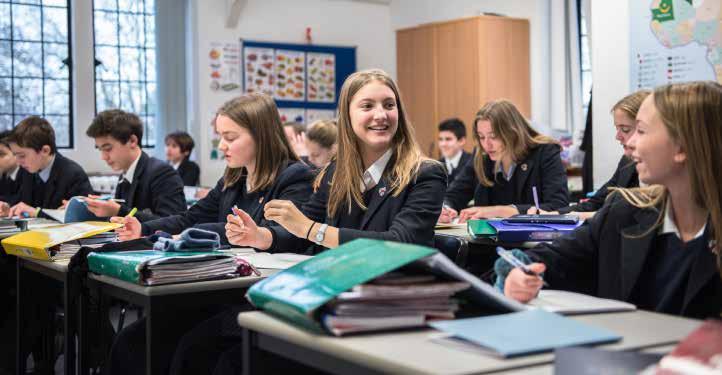
These intensive modern language courses offer the opportunity for pupils to acquire a thorough grounding in the essentials of rudimentary Italian or Portuguese in nine months. There is particular emphasis on the use of everyday colloquial language. From the outset, cultural aspects will play a major part in every lesson and participants will be offered several opportunities to broaden their linguistic prowess and cultural knowledge.
This option is aimed at those pupils who love Latin, but for whom Classics is a less viable option at University because of a current lack of Greek. The course focuses on language work, so that over the course of the year pupils can reach GCSE standard to attend Greek Summer School if they wish and make a strong university application for Classics.
This would also be a good option for any pupils looking at Ancient History, where Classical languages boost an application. Ambitious pupils wishing to sit Classical Greek GCSE in the Summer Term would need to learn the set texts (to (Euripides’ Medea and selections of Herodotus’ Histories) over the Easter holiday, with the aid of material provided by the department. There is also the option of the less demanding ICCG qualification, equivalent to half a GCSE of Greek language and recognised as a level 3 qualification for UCAS purposes.
The A level course encourages pupils to develop skills, creativity, imagination, and independence based on personal experience, taught skills and critical understanding. Pupils show this through their responses to a range of stimuli.
The aims and learning outcomes are to enable pupils to develop:
• Intellectual, imaginative, creative and intuitive capabilities
• Investigative, analytical, experimental, practical, technical and expressive skills, aesthetic understanding and critical judgement
• Independence of mind in developing, refining and communicating their own ideas, their own intentions and their own personal outcomes
• The experience of working with a broad range of media
• An understanding of the interrelationships between art, craft and design processes and an awareness of the contexts in which they operate.
Fine Art at Oundle is a vibrant and exciting subject with a reputation for diverse and mature work. The Art course in the Sixth Form is exciting and flexible. It progresses naturally from the philosophies and approaches adopted at GCSE. We encourage and expect pupils to pursue personal paths. There are considerable opportunities open to them in terms of the range and scale of the work they may undertake. Art is a subject that encourages individuals to be creative, reflective, communicative and appreciative of the world around them. Pupils undertake analytical drawing from a model throughout the course.
Pupils must have a genuine interest in, and commitment to, the subject. Pupils spend considerable time outside formal lessons researching, developing ideas and producing studies. Pupils are encouraged to attend a range of talks and discussions on Art at regular Yarrow Society meetings as well as attending exhibitions held in the Yarrow Gallery.
The department keeps in step with the shifting themes and ideas of contemporary art through visits to galleries and museums nationally and internationally. Destinations have included Paris, Berlin, Madrid, Amsterdam, Florence, Venice and New York. We also have a rich tradition of attracting professional artists to exhibit their work, undertake residencies, run workshops and work one on one with pupils. Recent artists include Jane McAdam Freud (daughter of Lucian Freud), Gigi Solomon and Susan Atwill.
The department has supported pupils with successful applications to the very best art institutions in the UK, including the University of Arts, London, and Glasgow School of Art, as well as the US.
Caroline Dent Head of Art
Pupils will have up to fifteen hours in which to independently realise their response(s).
Pupils are required to provide evidence of all assessment objectives in response to their chosen starting point, brief or stimulus, within the 15hour supervised time period. It is expected that during the supervised time period, pupils will realise their intentions to an outcome(s).
All selected work produced for the component, including the research, planning and development work produced in the preparatory period, must be submitted for assessment.
Each assessment objective is worth 25%.
• Develop their ideas through sustained and focused investigations informed by contextual and other sources, demonstrating analytical and critical understanding.
• Explore and select appropriate resources, media, materials, techniques and processes, reviewing and refining their ideas as their work develops.
• Record in visual and/or other forms ideas, observations and insights relevant to intentions, demonstrating an ability to reflect on work and progress.
• Present a personal, informed and meaningful response demonstrating critical understanding, realising intentions and, where appropriate, making connections between visual, oral or other elements.
Component 01: Personal investigation (120/200 marks, 60%)
This component comprises two discrete but linked elements.

ELEMENT 1: PRACTICAL PORTFOLIO (96/120 MARKS)
This is a practical portfolio with supporting contextual research in which pupils are expected to develop a personal response based on a set theme leading to a finished realisation(s) or outcome(s). This portfolio will consist of a sustained project, theme or course of study. The pupils should carefully select, organise and present work to ensure that they provide evidence of meeting all four assessment objectives.
Pupils must show they have:
• independently developed ideas through sustained and focused investigations in response to a given starting point
• produced material informed by contextual and other sources that informs the development of their practical work
• explored ideas, techniques, or processes appropriate to their chosen specialism(s)
• recorded observations from sources relevant to intentions
• used their planning and preparation to produce coherent realisation(s)/outcome(s).
Component 02: Externally set task (80/200 marks, 40%)
ELEMENT 2: RELATED STUDY (24/120 MARKS)
Pupils are required to establish through this written and, where appropriate, illustrated component, the related context in which their chosen practical portfolio exists. This may be established by exploring the genre, subject matter, movement or historical framework of the overarching starting point, course of study or theme selected.
The aim of the related study is to enable pupils to develop their ability to communicate their knowledge and understanding of art historical movements, genres, practitioners and artworks, considering the way that these change and evolve within chronological and other frameworks. It also builds their understanding of the relationship between society and art: art historical terms, concepts and issues; methods of researching, investigating and analysing; and how works are interpreted and evaluated.
The related study should be separate and clearly identifiable from the contextual research embedded in the development of the practical portfolio. Pupils may produce the related study in an appropriate form of which the following are some examples: an illustrated essay, digital presentation/ blog, illustrated study sheets or written report.
This paper is given to pupils on 1 February in the year of certification. The paper will give pupils a choice of seven themes, each with a choice of written and/or visual starting points, briefs or stimuli. From this paper, pupils are expected to choose one option for which they will generate an appropriate personal response for assessment.
Pupils are required to reach their own judgements and conclusions and must work independently to produce their own personal response. All work must be completed by the designated finishing time. Pupils can continue to work on their preparatory work until the first period of supervised time commences. Pupils must refer to their preparatory work during the supervised 15-hour period.

Biology in the Sixth Form is very much more concept-driven than at IGCSE. This allows for greater application of understanding. A level Biology does not require A level Chemistry and many pupils study Biological Sciences at University without this or other additional sciences. The Sixth Form course includes exciting and up-to-date topics such as gene technology, the human genome project, biotechnology and the control and regulation of gene expression, as well as more traditional areas such as biochemistry, ecology and aspects of plant, human and animal physiology. The content of the IGCSE course is developed further but several areas will be either completely new or in greater depth. This results in a deeper understanding of topics as well as a more integrated and inspiring appreciation of the living world. The department is growing in size as more and more pupils recognise the value of Biology in a sustainable future and the contribution of Biological research in solving global challenges.
Part of the course involves an extended weekend stay at a Field Study Centre in the UK, which allows pupils to undertake research for the aspects of the syllabus related to Ecology.
Attendance on this trip in the Summer Term of the Lower Sixth is compulsory, and the cost for this is added to the School bill. Following a successful diving and jungle trip to Mexico in 2023, we are looking forward to an overseas expedition in Indonesia during the summer of 2026. As often as opportunity allows, we explore the application of theory to the living world, engaging with its wonders.
Paul Batterbury, Head of Biology
Teaching is split into six modules with an additional, internally assessed component Practical Endorsement.
1 Development of practical skills in Biology
2 Foundations in Biology
3 Exchange and Transport
4 Biodiversity, Evolution and Disease
5 Communications, Homeostasis and Energy
6 Genetics, Evolution and Ecosystems
There are three written papers for final assessment, which incorporate multiple choice, structured and extended response questions. This allows for a cohesive and integrated approach to both teaching and examination. The papers are structured as follows.
• H420/01: Biological Processes, requiring knowledge from modules 1, 2, 3 and 5
• H420/02: Biological Diversity, requiring knowledge from modules 1, 2, 4 and 6
• H420/03: Unified Biology, requiring knowledge from all modules.
This is reported separately to the A level as a pass or fail. It requires a minimum of twelve practical activities (known as PAGs) carried out during routine lessons and covering a common core of apparatus and techniques. The practical tasks complement the content of the A level and may be examined in the written papers.
Chemistry in the Sixth Form, offers a practical and theoretical approach to the teaching of the subject and there is an increased emphasis on problem solving than in IGCSE. Through this, pupils develop the ability to solve chemical problems in varied contexts. Logical in its application, the course highlights the principles that unify the subject and seeks to examine them in depth through their application to chemical situations. It equips pupils with a good base of transferable skills and key knowledge suitable for future study and employment in chemistry and related fields (e.g. medicine, engineering, applied sciences and even law) whilst providing thought provoking material that may appeal to those who do not wish to pursue a scientific career.
Nicola Ebden Head of Chemistry
• Paper 1: Multiple Choice Questions
1 hour 15 minutes 40 Multiple-Choice questions based on the content cover in the Lower Sixth (15.5% of the A level).
• Paper 2: Structured Questions
1 hour 15 minutes 60 marks Structured questions based on the content cover in the Lower Sixth (23% of the A level).
• Paper 3: Practical Paper
40 marks Practical work and structured questions. Questions are based on experimental skills section of the syllabus (11.5% of the A level).
• Paper 4: Structured Questions
2 hour 100 marks Structured questions based on the content cover in the Upper Sixth (38.5% of the A level)
• Paper 5: Planning, Analysis and Evaluation
1 hour 15 minutes 30 marks Structured questions based on the experimental skills section of the syllabus (11.5% of the A level).

This course will particularly suit those interested in literature and history, as well as drama, politics and philosophy. No previous knowledge of the ancient world or the classical languages is required. A significant number of pupils choose to continue their studies of the ancient world with degree courses in Classics, Classical Civilisation, Ancient History and Archaeology.
Clare Westran Head of Classics
The Classical Civilisation course allows pupils to study some of the key moments and ideas in western history and literature. At the heart of the linear course is a compulsory paper covering the epics of Homer and Virgil. In addition, pupils will study the origins of Greek theatre, including both a close reading of works by Sophocles, Euripides and Aristophanes and an examination of the context in which the plays were performed. The third paper will allow pupils to explore the historical and political landscape of the late Roman Republic, through a range of literary and archaeological sources. Pupils concentrate on Greece in the Lower Sixth year, moving on to Rome in the Upper Sixth. There is a commitment to essay writing, but knowledge and understanding of the historical sources and literary texts is also explored through class discussion and context questions. There is no coursework.

• Paper 1: The world of the hero
Pupils will study either the Iliad or the Odyssey, and Virgil’s Aeneid in translation. As well as considering the texts, pupils will learn about the social, cultural and religious context.
• Paper 2: Culture and the arts
Pupils will study Greek theatre, including a close reading of two tragedies (Sophocles’ Oedipus the King and Euripides’ Bacchae) and one comedy (Aristophanes’ Frogs) in translation.
• Paper 3: Beliefs and ideas
Pupils will study Politics of the Late Republic, examining a range of sources in order to explore the power of personality in politics and the conflicting political values that contributed to the “fall” of the Roman Republic. Pupils will focus on three outstanding statesmen from that time: Cato the Younger, Julius Caesar and Cicero.
This course will particularly suit those interested in literature and history, as well as drama, politics and philosophy.

Computers are all-pervasive in modern life and Computer Science is the discipline that has made this possible. As well as learning how to program in both low and high-level programming languages, including procedural and object-oriented techniques, the course provides the opportunity to learn about the structure of the processor, how programs are translated into machine code that the processor can understand, database design, network infrastructure, modern web technologies and elements of law related to computer use.
Computational thinking is an important part of the syllabus: there is a good level of mathematics and logic required (including Boolean Algebra), highlevel algorithms such as Google’s Page Rank and Dijkstra’s Shortest path analysis, as well as how to measure the efficiency of algorithms using ‘Big O’ notation.
Pupils will be taught how to think abstractly to work out ways to solve problems, how to decompose a problem, breaking it down into manageable pieces and how to think logically. The practical element affords the opportunity for pupils to apply all these skills to a project of their choice, by writing a coded solution to a non-trivial problem. This provides ample opportunity for those who are already competent programmers to challenge their abilities.
Kevin Arnold Head of Computer Science
Pupils will be taught how to think abstractly to work out ways to solve problems, how to decompose a problem, breaking it down into manageable pieces, and how to think logically.
SCHEME OF ASSESSMENT
• Paper 1: Computer Systems
This unit deals with the workings of computer, programming languages, networking, and Boolean algebra as well as legal, moral and ethical issues.
• Paper 2: Algorithms and programming
This unit deals with computational thinking, recursion and other programming techniques and a variety of algorithms.
• Non-exam assessment: Programming Project Pupils choose a computing problem and develop a programmed solution. They will go through a full systems development lifecycle producing clear documentation to support their findings.
DET is concerned with designing and engineering products to improve the quality of people’s lives. The subject nurtures pupils towards being creative problem solvers within state-of-the-art facilities. Pupils may opt for either of two different courses, both of which offer the opportunity to explore a wide variety of media, equipment and designing strategies. The qualification will excite and engage learners with contemporary topics covering the breadth of this dynamic and evolving subject. It will create empathetic learners who have the ability to confidently critique products, situations and society in every walk of their lives now and in the future.
Jon Baker Director of Patrick Centre
Product Design is focused on consumer products and applications; their analysis in respect of materials, components, and marketability to understand their selection and uses in industrial and commercial practices of product development.
Design Engineering focuses on engineered and electronic products and systems; the analysis of these in respect of function, operation, components and materials, to understand their application and uses in products/systems that have commercial viability.
The Patrick Engineering Centre has been an amazing place to improve my DET skills and to try out new ideas. As a Scholar, the time I have spent in the Design, Engineering and Technology department has been invaluable and it has helped me to find and develop skills that I hope to use in a future motorsports engineering career.”
Iola Jones
Junior Engineer, Maclaren F1 Team.
Former Design Design, Engineering and Technology Scholar
OF ASSESSMENT (both syllabuses)
• Paper 1: Principles
Four sets of questions that predominantly cover technical principles within each endorsed title. Pupils are required to: analyse existing products, demonstrate applied mathematical skills and technical knowledge of materials, product functionality, manufacturing processes and techniques, demonstrate their understanding of wider social, moral and environmental issues that impact on the design and manufacturing industries.
• Paper 2: Problem Solving
This component has two sections that respond to selected tasks. Section A focuses on applying knowledge, understanding and skills of designing and manufacturing prototypes and products. Section B requires pupils to reflect on their design task in Section A in relation to wider factors/issues from the design principles.
• Iterative Design Project
The ‘Iterative Design Project’ requires pupils to undertake a substantial design, make and evaluative project centred on the iterative processes of exploration, creation and evaluation. Each pupil identifies a design opportunity or problem from a context of their own choice, and creates a portfolio of evidence in real time through the project to demonstrate their competence.
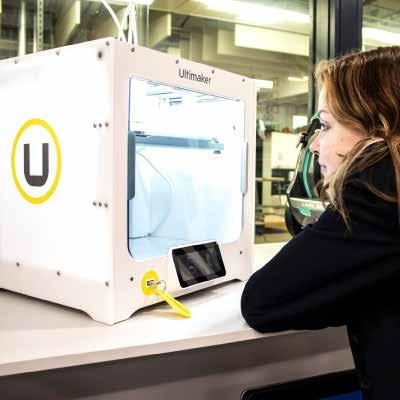
Pupils may opt for either of two different courses, both of which offer the opportunity to explore a wide variety of media, equipment and designing strategies.
The course is an academic and practical study of the theatrical arts. It provides pupils with the opportunity to study play texts, create performances, evaluate their own work and research the theories behind the practice of making. The subject is a collaborative enterprise where pupils are expected to communicate effectively, support their peers and manage their own time. The course covers all aspects of theatre and pupils have an opportunity to be examined in the practical units on performance or a technical element. Pupils learn many transferable skills which will benefit them beyond school, such as presentation skills, problem solving, creative thought and project management; they are encouraged to see as much theatre as possible and have the benefit of quality performances in The Stahl as well as a frequent trips to the theatre and professional workshops.
Pupils taking the subject need not have taken GCSE Drama. Previous involvement with Drama or Stahl productions will clearly aid their progress and understanding, but above all else pupils must demonstrate enthusiasm, be self-motivated and show an eagerness to succeed while collaborating effectively with others.
Matthew Burlington Head of Drama
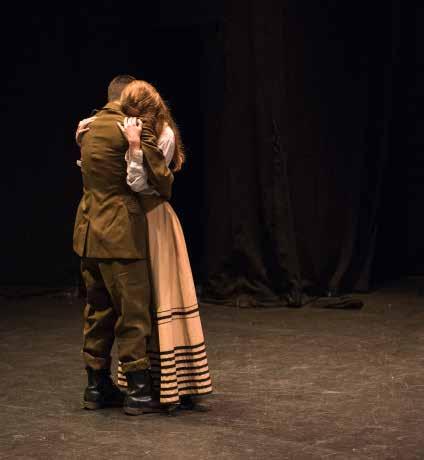
• Component 1: Theatre Workshop (Coursework)
The creation, development and performance of a piece of theatre based on a reinterpretation of an extract from a text chosen from a list supplied by the examination board. The piece must be developed using the techniques and working methods of either an influential theatre practitioner or a recognised theatre company.
• Component 2: Text in action (Visiting examination)
Learners participate in the creation, development and performance of two pieces of theatre based on a stimulus supplied by the examination board: a devised piece using the techniques and working methods of either an influential theatre practitioner or a recognised theatre company. An extract from a text in a contrasting style is chosen by the learner.
• Component 3: Text in performance
Sections A & B: Open book, two questions, based on two different texts; one written pre-1956 and one written post-1956.
Section C: Closed book. The extract of text required for answering the questions will be printed on the examination paper. A series of questions based on a specified extract from a contemporary set text chosen by the exam board
The course covers all aspects of theatre and pupils have an opportunity to be examined in the practical units on acting or a technical element.


Economics is the science of how societies choose about how to best allocate resources. No previous knowledge of Economics is expected but it overlaps with several subjects such as Geography, Psychology, History and TPR. As such, Economics compliments a wide range of subject combinations, allowing STEM specialists to demonstrate the construct of argument, while those more inclined to the Humanities, an opportunity for numeracy.
We consider questions such as:
• How can we maximise the wellbeing of society?
• How can inequality within and between countries be reduced?
• How can we better protect the environment for future generations?
• Should the government impose ‘sin taxes’ or is this an undesirable ‘Nanny State’?
• Who should be taxed and where should the money be spent?
• How do individuals, firms and government manipulate your decision making?
• Who created the Global Financial Crisis of 2008?
• Do large firms like Spotify, Netflix or Amazon exploit or benefit their customers?
• Will a Trump presidency in the US benefit the UK economy?’
• Should decisions be left to individuals and firms or should the government be more involved in the economy to protect the vulnerable?
Contrary to popular opinion, A Level Economics does not have significant Mathematical content, although a degree in Economics requires much more sophisticated level of Mathematics. There are lots of graphs to interpret. The assessment is predominantly through essay writing, so a good grade in GCSE English Language is desirable.
Old Oundelians who have studied in the department have gone on to successfully read Economics, Management and Business-related degrees at a wide range of institutions, across the world.
‘The single most important issue for the majority of voters is the economy, stupid’
Paul Nutter Head of Economics
Economics at Oundle follows the AQA specification with 3 separate, 2 hours examinations.
• Paper 1: Markets and Market Failure
This is focussed on Microeconomics and incorporates a 1 hour section of Data Response Questions including a calculation, interpretation of data, a short explanation of an economic concept applied to a real world scenario. There is then an evaluation of economic argument, which leads the pupils to conclude with a justified judgement, having considered differing assumptions, parameters and perspectives.
The second hour, again, requires pupils to write an essay, the first part of which explains an economic theory using real world examples and case studies considered within the course. The second part is another evaluative essay, requiring the same structure as the long question in the data response question.
• Paper 2: The National and International Economy
This is focussed on Macroeconomics and has exactly the same structure as Paper 1.
• Paper 3: Economic Principles and Issues
This is a synoptic paper incorporating both Microeconomics and Macroeconomics content and skills, already covered on both Papers 1 and 2. It comprises 30 multiple-choice questions, alongside a data response question, which examines a breadth of economic models from both sides of the course.
Pupils develop important skills of close analysis, reasoned judgement and detailed and confident argument whilst also increasing their sensitivity to how language is used to shape meaning.

Studying literature is nothing short of studying life. In the pages of great books exist immense ranges of characters, experiences and emotions. In encountering these things, the reader is exposed to infinitely more situations than he or she could ever witness directly, is shown what the world looks like to different people in different circumstances and is challenged to consider (and maybe even reconsider) his or her own beliefs and values.
Pupils studying English at A level are introduced to a wide range of novels, plays and poems from the medieval period to the present day. They are asked to think about their own responses to these texts as well as how the texts have been read by other people at other times. Reflecting on how contexts influence the writing and reading of literature is a key aspect of the course. Pupils therefore develop important skills of close analysis, reasoned judgement and detailed and confident argument while also increasing their sensitivity to how language is used to shape meaning.
Pupils considering this course should be committed to reading texts of different genres and styles. Equally important is a willingness to discuss these texts with others. Class discussion is a central element in how the course is taught, not least because discussions develop pupils’ abilities in thinking critically and independently.
Tim Hipperson Head of English
• Paper 1: Drama and Poetry
Pupils study one drama text and one poetry text. They answer one essay question on each text in the examination.
• Paper 2: Prose and Unseen
Pupils study one prose text and any number of passages of poetry, prose and drama selected by their teacher to learn how to respond to previously unseen material. In the examination, pupils answer one essay question on their prose text and one question on an unseen passage of poetry, prose or drama.
• Paper 3: Shakespeare and Drama
Pupils study one play by Shakespeare (for 2025, either Hamlet or The Taming of the Shrew) and one other play. They answer one essay question on each play in the examination.
• Paper 4: Pre- and Post- 1900 Poetry and Prose
Pupils study one poetry text and one prose text. One text must be from before 1900 and one text must be from after 1900. They answer one essay question on each text in the examination.
Geography is a dynamic, academic subject that is constantly evolving. The importance of Geography as a subject has never been greater, with climatic and demographic changes having significant global impacts, as well as the spatial connections that have enabled not just global trade to flourish but have encouraged the development of low-income countries worldwide. The Geography Department at Oundle works hard to stay abreast of contemporary geographical issues, delivering lessons that are up-to-date and underpinned with high expectations and the most recent pedagogical ideas.
An understanding of the issues we cover will enable pupils to contribute to the social, economic, political and environmental challenges that will shape their future.
Kathryn Yarker Head of Geography

The increasingly popular Geography A level follows the OCR specification. This includes two core topics: Earth’s Life Support Systems and Changing Spaces, Making Places. Further to this, pupils study Dryland Landscapes, Global Migration and Power and Borders. These topics are examined in two papers: Physical Systems and Human Interactions. Both exams are 1hr 30 minutes.
The third exam in the A level series is titled ‘Geographical Debates’ and pupils are tested on two main topics as well as testing their synoptic knowledge and understanding. Hazardous Earth, Disease Dilemmas or Exploring Oceans are the topics currently taught at Oundle. This paper is 2 hrs 30 minutes.
The examinations make up 80% of the A level, with the final 20% taking the form of an Independent Investigation (sometimes referred to as the NEA – Non-Examined Assessment). This coursework style project requires pupils to conduct four days of compulsory residential field study, which is led by Oundle Staff at different locations. In 2024, pupils completed an urban investigation in Birmingham focusing on the regeneration of Birmingham city centre before travelling to Rhyd-y-Creuau to conduct water and carbon related fieldwork in the beautiful Snowdonia National Park, Wales. In 2025, pupils are due to visit Birmingham and FSC Blencathra in the Lake District National Park, Cumbria.
Based on their experience and learning, pupils will then design and undertake their own investigation in a topic of their choice (it must link to the OCR specification) and produce a detailed write-up of the investigation process and outcomes approximately 3000 – 4000 words. This is marked and moderated by Oundle staff before being externally moderated by the exam board.
An understanding of the issues we cover will enable pupils to contribute to the social, economic, political and environmental challenges that will shape their future.
The political landscape has never been more unpredictable than at the present time with old assumptions and institutions under challenge from the rise of populism with its profound consequences both in the UK and the USA. Politics will appeal to those who are interested in the structures of power and authority within British society and the USA. The course examines the way that institutions in the UK and US resolve conflicts, allocate resources and respond to changing political behaviour. In addition pupils will explore the key ideologies which have shaped the polity of the UK and USA and the key thinkers who have developed discourse in the areas of conservatism, liberalism, socialism and anarchism.
The A level course compromises three modules: each equally weighted and assessed by a written examination.
Duncan Hine Head of Government and Politics
• Paper 1: UK Politics and Core Political Ideas
The central ideas of citizenship, democracy and participation will be examined. Pupils will also learn about the significance of Political Parties, Pressure Groups and Referendums as well as the traditional political ideas of Conservatism, Liberalism and Socialism.
• Paper 2: UK Government and Non-Core Political Ideas
This unit examines the functioning of the constitution, the role and significance of Parliament, the power of the executive and the role of the courts in protecting civil liberties. The key strands of anarchism will also be examined.
• Paper 3: USA and Comparative Politics
This module involves a study of the US Constitution, Congress, the Presidency and the Supreme Court. In addition issues of civil rights, democracy and participation are covered. The comparative element examines rational, cultural and structural approaches to explain the similarities and differences between the UK and US political systems.
Politics will appeal to those who are interested in the structures of power and authority within British a society and the USA.

The A level Greek course continues to develop the skills used at GCSE: the understanding of the linguistic structures of Greek, the critical interpretation of Greek literature, and an awareness of the ancient Greek cultural context. Pupils sit two language papers, one testing their ability to translate Greek prose and verse into English, and the other assessing language skills through comprehension and grammar questions or translation from English into Greek. There is some additional grammar to cover, but no set vocabulary list: instead pupils improve their understanding of the language by
This course continues to develop the skills used at GCSE: the understanding of the linguistic structures of Greek, the critical interpretation of Greek literature, and an awareness of the ancient Greek cultural context.
reading and discussing lots of original Greek, and in doing so become more confident in dealing with idiomatic ‘real’ Greek. The remaining two papers test the ability to comment sensitively on texts that will have been studied over the two years: one paper for prose and one for verse. The linear course has the flexibility to allow pupils to study two set texts in real depth, or to look at a broader range of authors. There is no coursework.
Clare Westran Head of Classics
• Unit 1a: Unseen Translation / Unit 1b: Unseen Comprehension / or Prose Composition
Pupils build on their knowledge of vocabulary and linguistic structures. There is no defined vocabulary list, but candidates are expected to be familiar with the language used by the specified authors.
• Unit 2: Prose Literature
Pupils study and discuss a prescribed amount of Greek text, as well as some of the text in translation, to give a better understanding of its context. There is a choice of texts, including Herodotus’ Histories, Plato’s Crito and Lucian’s Charon.
• Unit 3: Verse Literature
Pupils study and discuss a prescribed amount of Greek text, as well as some of the text in translation to give a better understanding of its context. There is a choice of texts, including Homer’s Odyssey, Sophocles’ Electra and Aristophanes’ Birds.
The History course is challenging, rewarding and wide-ranging. Studying History at this level enhances pupils’ skills in critical analysis and encourages them to write with clarity and precision within the framework of a clearly constructed line of argument. Pupils are encouraged to discover information and ideas for themselves with the guidance of their teachers. There is a great emphasis on independent learning as the course includes a substantial piece of independent coursework. Pupils should show a willingness to read around the subject and an ability to write clear, precise English. Very occasionally a pupil takes History in the Sixth Form without the GCSE.
The course is assessed by three terminal exams, alongside the submission of the independent Topicbased essay in the Upper Sixth Form. Pupils are encouraged to be flexible and open to studying different periods and can select their favoured historical topic as their Topic-based essay.
Jonathan Allard Head of History
• Unit 1: British period study and enquiry
Pupils study a period of British history. Papers currently offered are drawn from the medieval, early modern and modern periods.
• Unit 2: Non-British period study
Pupils will study an element of history from beyond the British Isles. Papers currently offered include the Crusades, the USA in the nineteenth century and modern France.
• Unit 3: Thematic study and historical interpretations
Pupils undertake a thematic study over a period of at least 100 years, as well as investigating how historians have interpreted key issues. Current papers include German nationalism, the nature of warfare and civil rights in the USA.
• Topic-based essay
Pupils will research and write a 4,000-word essay on a topic of their choice. The title is formulated in conjunction with the coursework teacher and must be approved by the exam board.
Studying History at this level enhances pupils’ skills in critical analysis and encourages them to write with clarity and precision within the framework of a clearly constructed line of argument.

History of Art is a unique and fascinating subject that mines ideas and knowledge across disciplines to understand the art and architecture of past and present civilisations. Lessons examine the composition, techniques and materials of art, exploring cultural contexts to ask why, how and for whom works of art were made — and how those works reveal something of the people and culture from which they came. Pupils learn to think critically, and question received wisdom from artists and art historians. They develop essay writing skills and are taught how to construct persuasive lines of argument to answer specific questions. Through our two themes, Nature and Identities, pupils will learn about art from the ancient world to the present day
• Paper 1: Visual Analysis and Themes 50%
and from both Western and non-Western traditions. In the Periods section of the course, pupils will gain a deep understanding of our chosen areas: British and French Avant-Garde (1848–99) and Modernism in Europe (1900-39). There is no requirement for experience in the subject or for GCSE Art, but pupils must possess curiosity about art and architecture and good essay writing skills. Every year we arrange a day trip to London galleries as well as a long trip to either New York or a European city, in recent years we have visited Berlin, Amsterdam, Madrid, Florence and Paris.
Tristan MacDougall Head of History of Art
Section A - Visual Analysis. In the exam pupils need to comment on photographs of a painting, a sculpture and a building. In our lessons we progressively build core skills in visual literacy over the whole two years of the course.
Section B – Themes. Our chosen themes are Nature in Art and Architecture, and Identities in Art and Architecture. Pupils answer a single question in two parts for each theme.
• Paper 2: Periods 50%
Our chosen periods are: Rebellion and Revival: the British and French Avant-Garde (1848‒99) and Brave New World : Modernism in Europe (1900-39). For each Period, pupils answer a single compulsory question in four parts.

History of Art can be taken alongside many other subjects in the humanities or sciences. Pupils should have strong essay writing skills and possess curiosity in art, architecture, culture and society.

Pupils sit two language papers, one testing their ability to translate Latin prose and verse into English, and the other assessing language skills through comprehension and grammar questions or translation from English into Latin. There is some additional grammar to cover, but no set vocabulary list: instead pupils improve their understanding of the language by reading and discussing lots of original Latin, and in doing so become more confident in dealing with idiomatic ‘real’ Latin.
The remaining two papers test the ability to comment sensitively on texts that will have been studied over the two years: one paper for prose and one for verse. The linear course has the flexibility to allow pupils to study two set texts in real depth, or to look at a broader range of authors. There is no coursework.
Clare Westran Head of Classics
The A level Latin course continues to develop the skills used at GCSE: the understanding of the linguistic structures of Latin, the critical interpretation of Latin literature, and an awareness of the ancient Roman cultural context.
• Unit 1a: Unseen Translation / Unit 1b: Unseen Comprehension / or Prose Composition
Pupils build on their knowledge of vocabulary and linguistic structures. There is no defined vocabulary list, but candidates are expected to be familiar with the language used by the specified authors.
• Unit 2: Prose Literature
Pupils study and discuss a prescribed amount of Latin text, as well as some of the text in translation to give a better understanding of the context. There is a choice of texts, including Cicero’s pro Roscio Amerino, Nepos, Life of Hannibal, Tacitus Annals and Apuleius, Metamorphoses.
• Unit 3: Verse Literature
Pupils study and discuss a prescribed amount of Latin text, as well as some of the text in translation to give a better understanding of the context. There is a choice of texts, including Virgil’s Aeneid, Tibullus, Elegies, Lucretius De Rerum Natura and Ovid, Metamorphoses.
Mathematics is a worthwhile, interesting, human activity. Everyone should have the opportunity to be mathematical and to succeed mathematically. Intelligence and ability are not fixed: we can all develop our skills and understanding in many ways. A key activity is to grapple with problems that one does not yet know how to solve, and exchanging questions and ideas is a valuable aspect of working mathematically. We can learn much by studying our mistakes and misconceptions and by understanding that there are many ways to be mathematical.
The Mathematics course is designed to:
• give pupils the opportunity to think mathematically;
• support pupils in developing their own understanding;
• invite pupils to make connections for themselves;
• nurture pupils mathematical independence, and
• help pupils to develop resilience, flexibility and creativity.
In the so-called knowledge economy which pupils are entering after school, Mathematics is highly desired due to the logical and analytical problem solving skills it develops. Through solving problems you develop resilience and are able to think creatively and strategically. The writing of structured solutions, proof and justification of results help you to formulate reasoned arguments. Importantly you will have excellent numeracy skills and the ability to process and interpret data.
Lewis Kelly Head of Mathematics
Everything that applies to Mathematics applies to Further Mathematics, but these days Mathematics pervades many more subjects, as they recognise the important role that quantitative analysis has to play in all walks of life. Reasons to study Further Mathematics include:
Pupils taking Further Mathematics overwhelmingly find it to be an enjoyable, rewarding, stimulating and empowering experience. It is a challenging qualification, which both extends and deepens your knowledge and understanding beyond the standard A level Mathematics.
For someone who enjoys Mathematics, it provides a challenge and a chance to explore new and/or more sophisticated mathematical concepts. As well as learning new areas of pure Mathematics you will study further applications of Mathematics in mechanics and statistics.
Pupils who take Further Mathematics find that the additional time spent studying Mathematics boosts their marks in single A level Mathematics. Studying
Further Mathematics consolidates and reinforces your standard A level Mathematics work, helping you to achieve your best possible grades.
It makes the transition from Sixth Form to university courses which are mathematically rich that much easier as more of the first year course content will be familiar. If you are planning to take a degree such as Engineering, Sciences, Computing, Finance/ Economics, or perhaps Mathematics itself, you will benefit enormously from taking Further Mathematics.
It enables pupils to distinguish themselves as able mathematicians in their applications for university and future employment. Further Mathematics qualifications are highly regarded and are warmly welcomed by universities. Pupils who take Further Mathematics are really demonstrating a strong commitment to their studies, as well as learning Mathematics that is very useful for any mathematically rich degree.
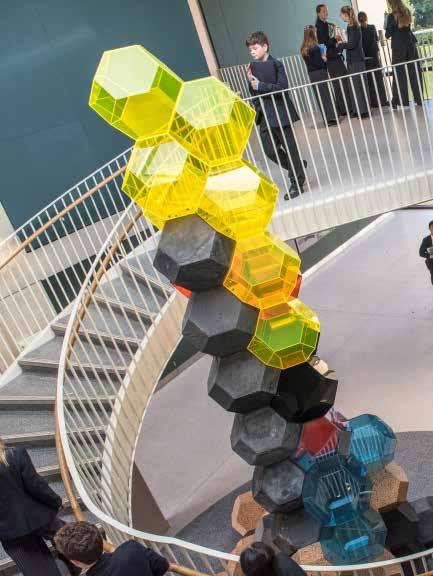
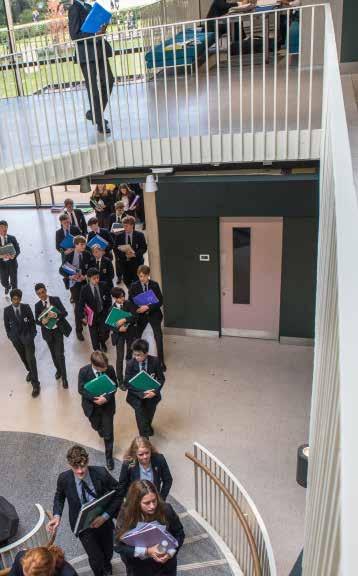
• Mathematics
Two papers in Pure Mathematics, one in Mechanics and Statistics
• Further Mathematics
Two papers in Pure Mathematics and two papers in Applied Mathematics SCHEME OF ASSESSMENT
Mathematics and Further Mathematics
The Mathematics and Further Mathematics options occupy two of the four principal-subject option blocks. In this option pupils have almost double the contact time, 11 periods per week.
Only two other A level choices will therefore be available. These must also be continued for two years to ensure pupils have a breadth of study, desirable for universities.
Further Mathematics is taught entirely separately from Single Mathematics, in different sets. This is to allow the pace to be tailored to the ability of the set.
In the so-called knowledge economy which pupils are entering after school, Mathematics is highly desired due to the logical and analytical problem solving skills it develops. Through solving problems you develop resilience and are able to think creatively and strategically.
The aim of these syllabuses is to enable candidates to develop the skills needed for confident communication in their chosen language, as well as to provide them with an opportunity to gain an insight into contemporary cultural issues.
Intellectual advancement through close engagement with a wide range of texts, the articulation of readings and justification of opinions is carried out at this level in both their chosen language and English. Reading and sustained critical thought through the study of literature will promote a finer feel for the subtleties and possibilities of their chosen language and crucially provide the critical tools and analytical skills required for further study in languages, as well
Sam Thater Head of Modern Foreign Languages
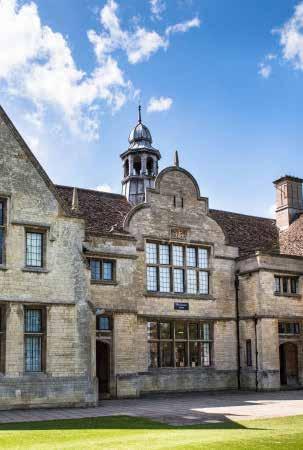
as in the workplace. This option will take the form of an examination with listening, speaking, reading, translation and writing all assessed.
In addition to practising listening and reading, particular attention is paid to the promotion of accuracy and the wealth of structures in speaking and writing. The emphasis on grammar and syntax will result in an increased sophistication in the way candidates can express their own ideas and build them into a cogent argument. We encourage all pupils to spend some time in the target language country during the two years and offer several study trips, and/or exchanges throughout the Sixth Form.
Through studying a Modern Foreign Language, pupils will learn from accessible and authentic materials adapted from a variety of sources: websites, social media, news and magazines. Weekly speaking sessions with a Foreign Language Assistant will quickly develop pupils’ fluency and confidence, as well as target individual learning needs.
Study of Literature and Film provides an exciting challenge for pupils to think laterally, critically and creatively. It also encourages pupils to learn how to structure their essays, and to substantiate their ideas in their chosen language.
Intellectual advancement through close engagement with a wide range of texts, the articulation of readings and justification of opinions is carried out at this level.

Music A level is a rigorous academic subject which sets pupils up well for university study: it is one of the most multi-disciplinary of subjects and offers a superb opportunity to set pupils apart to Admissions Tutors. Analysis skills sit well for Law, Science and Maths; whilst performance develops focus, confidence, processing, presentation and fine motor neuron workouts! The study of Music can help prepare for any choice of degree, in both arts and sciences and the key elements of creativity, selfdiscipline and critical analysis through written work are highly desirable skills and widely recognised in industry at large.
Pupils considering this A level should have a genuine love of Music with a keen interest in listening to and reading about a wide range of styles and genres. They will normally have done GCSE music and have instrumental skills around Grades 6-8. The course extends the core skills from GCSE and the structure is identical with the weighting: 30% Performance, 30% Composition and 40% Appraising (Listening, Analysis and History).
All elements of coursework are prepared in academic lesson time, with the performance aspect of the A level developed through instrumental lessons.
Pupils have gone on to study Music at Cambridge, Oxford, Durham, Manchester, King’s College London, the Tonmeister course at Surrey, as well as the specialist UK conservatoires.
Elizabeth Arkell Head of Academic Music
• Performing (externally assessed)
A public performance of one or more piece, solo or in an ensemble with at least 8 minutes of music. This has to be recorded after 1st March in the year of certification
• Composing (externally assessed)
Two compositions: one to a brief or a free composition (40 marks and at least 4 minutes); the other a compositional technique (20 marks and at least 1 minute). Total time across both must be at least 6 minutes. Composition work allows pupils to explore their creativity and develop musical ideas based on their academic study.
• Appraising
Application of knowledge through the context of six areas of study, encompassing thirteen set works. Historical and Analytical study is based on set works from a variety of styles. The examination will consist of three listening questions related to set works, one dictation exercise and two essay questions (one drawing links from the set works to music heard as an unfamiliar extract and one evaluating the musical elements, context and language of a choice of set works).
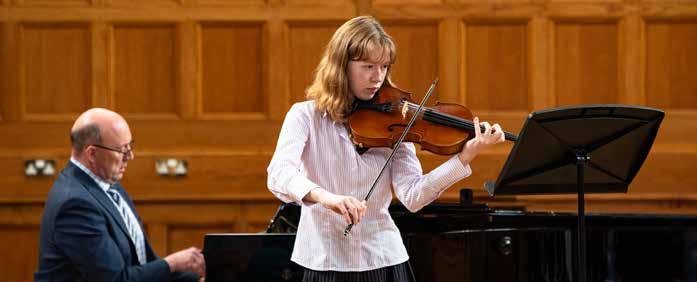

Pupils considering this A Level should have a genuine love of Music with a keen interest in listening to and reading about a wide range of styles and genres.
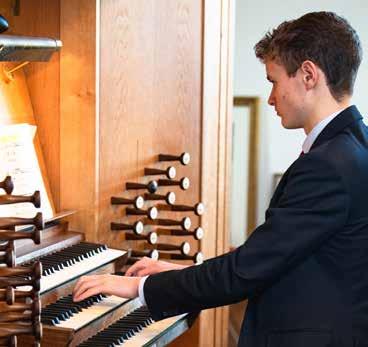
Physics is about the world around us, the way it works and why it behaves in the way it does. It delves into the concepts that explain the universe, from the subatomic to the cosmic, from the candle flame to the nuclear fires of a star. Studying Physics at A level will start you on the journey of discovery.
Physics develops a range of skills: the application of Mathematics through problem solving, logical thought processes and mathematical modelling, the use of ICT, as well as practical and observational skills. The course covers classical physics in depth: mechanics, waves and oscillations, electricity and magnetism, materials, gravitational and electric fields. This takes us onto more complex and interesting topics, including nuclear physics, cosmology, quantum mechanics and medical physics. This is a course that stretches even the most able. Pupils will gain confidence with using
• Paper 1: Multiple Choice Questions
1 hour 15 minutes 40 Multiple-Choice questions based on the content cover in the Lower Sixth (15.5% of the A level).
• Paper 2: Structured Questions
1 hour 15 minutes 60 marks Structured questions based on the content cover in the Lower Sixth (23% of the A level).
• Paper 3: Practical Paper
40 marks Practical work and structured questions. Questions are based on experimental skills section of the syllabus (11.5% of the A level).
• Paper 4: Structured Questions
2 hour 100 marks Structured questions based on the content cover in the Upper Sixth (38.5% of the A level)
• Paper 5: Planning, Analysis and Evaluation
1 hour 15 minutes 30 marks Structured questions based on the experimental skills section of the syllabus (11.5% of the A level).
experimental apparatus, competence in obtaining precise and accurate data, along with the ability to make predictions and draw conclusions. The A level Physics course aims to develop relevant attitudes, such as concern for accuracy and precision, objectivity, integrity, enquiry, initiative and inventiveness. These are all essential scientific skills required for progression to further studies or employment. There are weekly extension sessions for pupils who are making applications for competitive Physics and Engineering courses. Although it is not a formal requirement, it is expected that most pupils will also be studying A level Mathematics. We would also expect those opting to take Physics to have at least a 7 in both Maths and Physics GCSE.
David Talbot Head of Physics
The beauty of Physics lies in the simplicity of the underlying physical theories, and in the manner in which a small number of fundamental concepts and assumptions can alter and expand our view of the world around us.
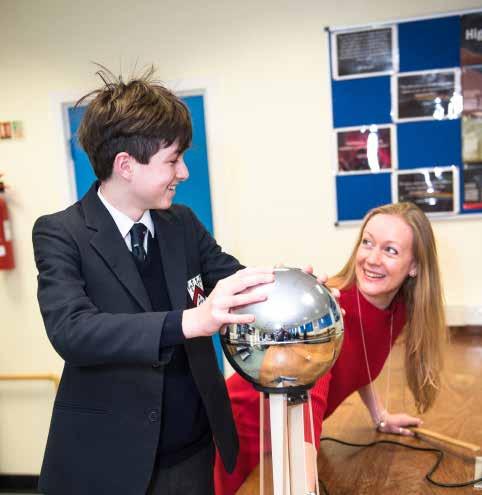
Psychology is about asking questions and evaluating our answers. Why do we think, feel and behave the way we do? How should we conduct psychological research that is scientific, ethical, and has practical applications?
The emphasis in the course is on teaching pupils practical skills required for conducting research, evaluative skills needed to challenge established findings, and exploring the major theoretical approaches Psychology uses to explain human behaviour. Pupils will use these skills in looking at how Psychology is applied to everyday life. In all tasks we encourage a spirit of independent enquiry and a strong reliance upon scientific method. Psychology carefully and effectively bridges the gap between the sciences and humanities. It requires rigorously collected empirical evidence to be critically analysed in the form of extended answers, building on arguments and current debates.
The specification has a large emphasis on the scientific nature of Psychology. 25–30% of overall assessment will assess knowledge and understanding of research methods, while 10% will require mathematical skill. Owing to this, we recommend that pupils have obtained a grade 7 or above in both GCSE Mathematics and GCSE Biology. All three papers will be externally examined at the end of the Upper Sixth year.
Samantha Reid Head of Psychology
• Paper 1: Introductory topics in Psychology
A combination of multiple choice, short answer and extended writing. This unit consists of four sections, each focusing on a compulsory topic: Social influence, Memory, Attachment and Clinical Psychology and Mental Health.
• Paper 2: Psychology in context
A combination of multiple choice, short answer and extended writing. There are three sections, each focusing on a compulsory topic: Appoaches in Psychology, Biopsychology and Research Methods. Pupils need to show understanding of designing and conducting research and analysing data throughout this paper.
• Paper 3: Issues and Options in Psychology
The compulsory topic in this paper is Issues and Debates in Psychology. This will focus on gender and culture, free will and determinism, nature-nurture, holism and reductionism and ethical implications of conducting research. Assessment is through multiple choice and both short and extended answers.
Gender (Gender development, sex-roles and the role of chromosomes and hormones)
Schizophrenia (Classification, biological/ psychological explainations, drug treatments and CBT)
Forensic Psychology (Offender profiling, biological/ psychological explanations, dealing with offender behaviour)
The emphasis in the course is on teaching pupils practical skills required for conducting research, evaluative skills needed to challenge established findings, and exploring the major theoretical approaches Psychology uses to explain human behaviour.

Sport Science addresses the development of the holistic person. The course is invaluable for pupils wishing to study a sport related area up to degree level. However, pupils who show aptitude and interest for Sport Science could use the subject for matriculation as an undergraduate in an unrelated subject area.
The academic content of the course is challenging, yet accessible. It comprises the following four components. Firstly, the Physiological factors affecting performance, including applied anatomy, exercise physiology and applied bio-mechanics (the latter enables the principles of physics to be addressed in a practical format during realistic
Paper 1: Physiological factors affecting performance
• Applied anatomy and physiology
• Exercise physiology
• Biomechanics
sporting situations).
Secondly, the Psychological factors, covering Skill acquisition and Sports Psychology (optimising performance). Thirdly, the socio-cultural issues in physical activity and sport involving; a study of sport in a societal context and Contemporary Issues in sport for example, ethics, Olympic Games and origins of sport. Finally there is the practical and analytical evaluation of sporting performance.
Jamie Lennard Head of Physical Education
Paper 2: Psychological factors affecting performance
• Skill acquisition
• Sports psychology Paper 3: Socio-cultural issues in physical activity and sport
• Sport and society
• Contemporary issues in physical activity and sport
Non-exam assessment: Performance in Sport Science
• Performance or coaching
• Evaluation and Analysis of Performance for Improvement (EAPI)
The course is invaluable for pupils wishing to study a sport related area up to degree level. The academic content of the course is challenging yet accessible.
This course aims to develop an understanding of the shared heritage of Philosophy, Theology and Ethics. Scholars from all three disciplines have had an influence on the development of western civilisation, and have affected the way in which societies and individuals think and act. Engaging with these thinkers encourages critical examination and evaluation of evidence and arguments, and develops the ability to construct, develop and maintain a clear and coherent argument. In addition it encourages wide reading and introduces pupils to some of the key ideas and texts which have played a large role in shaping our intellectual heritage.
Although the course is a natural progression from the GCSE course, pupils do not need to have studied it in order to study the A level.
Max Wood Head of Theology, Philosophy and Religion
SCHEME OF ASSESSMENT
Pupils take three papers, which are equally weighted. Topics include:
• Paper 1: Philosophy of Religion
Plato and Aristotle; The nature of the soul, mind and body; the existence or non-existence of God; the Problem of Evil; what is ‘God’.
• Paper 2: Ethics
Ethical theories (e.g. Utilitarianism, Kantianism); Philosophy of Language (the meaning of ‘Good’); Medical Ethics; Business Ethics; Sexual Ethics.
• Paper 3: Developments in Theology
Christian Moral Principles; The Person of Jesus Christ; Human Nature; Death and the Afterlife; Secularism; Karl Marx; Dietrich Bonhoeffer.
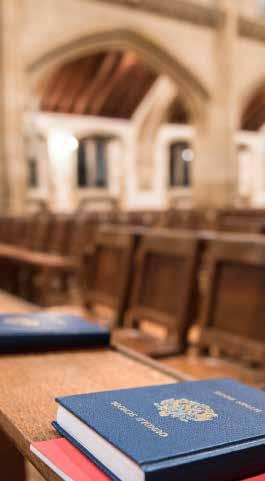
Personal religious belief is neither an advantage nor disadvantage as pupils are examined on how they argue, rather than what they believe.
Subject Board Code
Fine Art OCR H601
Biology OCR H420
Chemistry CAIE 9701
Classical Civilisation OCR H408
Classical Greek OCR H444
Computer Science OCR H446
DET Product Design OCR H406
DET Design Engineering OCR H404
Drama and Theatre EDUQAS A690QS
Economics AQA 7136
English Literature CAIE 9695
French AQA 7652
Further Mathematics Edexcel 9FM0
Geography OCR H481
German AQA 7762
History OCR H505
History of Art Edexcel 9HT0
Italian Edexcel 9IN0
Latin OCR H443
Mandarin Chinese Edexcel 9CN0
Mathematics Edexcel 9MA0
Music Edexcel 9MU0
Physical Education OCR H555
Physics CAIE 9702
Politics Edexcel 9PL0
Psychology AQA 7182
Russian Edexcel 9RU0
Spanish AQA 7692
Theology, Philosophy and Religion OCR H573
Assessment varies from subject to subject and details are given with each subject entry. All courses are examined as A levels, which are taught in a linear fashion, and assessed via a set of terminal examination papers, sat in the summer of the Upper Sixth. Some courses have additional coursework requirements, or portfolios of work which are prepared over the two years of study and then submitted to be marked centrally by the examination board.
All A level units and examinations are automatically certificated (colloquially, “cashed in”) in order to obtain a final grade. This is done at the end of the Upper Sixth; once the grade is awarded it cannot be declined. Marks for each paper or unit vary, as do the total number of marks available for a subject.
Most leading universities make their offers based on exam grades. Offers are occasionally made on the basis of a pointscore, known as the UCAS Tariff. This tariff, given in the table opposite, allows a comparison between the different grades available for different awards.
Educational Support continues to be available for those pupils with specific learning difficulties and neurodiverse profiles such as autism and ADHD. Lessons are normally provided on a one-to-one basis and are timetabled so that they do not interfere with the normal curriculum. A charge may be made for these individual lessons.
Support is provided in the following areas: organisation, essay planning and structuring, research methods, general study skills, effective revision strategies, examination technique, note-taking and consolidation of underlying mathematical methods. In addition, Study Skills Surgeries run on Tuesdays and Wednesdays after School, which allow any pupil across the School to book an individual session with a specialist teacher in the Department.
Helen Whitehurst SENCO
The English for Academic Purposes Department offers nonnative English speakers the opportunity to explore cultural context and advanced aspects of the English language that will support them in successful academic study at school and beyond. There is often a particular focus on writing skills, as these are the hardest to master.
Universities have differing English language requirements but commonly require international pupils who are non-native English speakers to pass a language placement test such as IELTS (International English Language Testing System). Pupils arrange to take the test at a time and place of their choosing but we can help to advise and, by arrangement with individual pupils, oversee elements of their preparation for any language placement test.
Any pupil is welcome to book a one-off appointment for help or advice about English language matters. Regular lessons are usually provided on a one-to-one basis and there is a cost attached but they are timetabled so that they do not interfere with the normal curriculum.
Zoe Thomas Head of English for Academic Purposes

